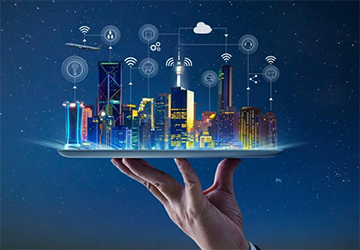The Future of Smart Cities- Technology for Sustainable Development
The paradigm of smart cities has garnered substantial momentum in recent years as urban areas aspire to become more efficient, sustainable, and habitable. The amalgamation of advanced technologies in urban development is perceived as a pivotal driver in attaining these objectives. This discourse delves into innovative city sustainability projects, the indispensability of technology in innovative urban development, and the potential of future smart city innovations to metamorphose our metropolises.
The paradigm of smart cities has garnered substantial momentum in recent years as urban areas aspire to become more efficient, sustainable, and habitable. The amalgamation of advanced technologies in urban development is perceived as a pivotal driver in attaining these objectives. This discourse delves into innovative city sustainability projects, the indispensability of technology in innovative urban development, and the potential of future smart city innovations to metamorphose our metropolises.

The Imperative for Smart City Sustainability Projects
As the global populace continues its relentless march towards urbanization, cities are besieged by myriad challenges, including overcrowding, pollution, and resource allocation. Innovative city sustainability projects endeavour to mitigate these issues by implementing avant-garde solutions that champion environmental, economic, and social sustainability. These initiatives often concentrate on:
- Curtailing energy consumption through intelligent grids and renewable energy sources
- Enhancing waste management and recycling systems
- Augmenting public transportation networks to alleviate traffic congestion and emissions
- Implementing green building practices and sustainable urban planning
The Indispensability of Technology in Smart Urban Development
Technology serves as a linchpin in transforming traditional cities into smart cities. Technology in innovative urban development encompasses a plethora of innovations, including:
Internet of Things (IoT): IoT devices accrue and analyze data from diverse sources, enabling cities to monitor and manage resources with heightened efficacy. For instance, intelligent sensors can track real-time air quality, traffic flow, and energy consumption, facilitating proactive decision-making.
- Artificial Intelligence (AI): AI algorithms can optimize urban operations, such as traffic management, energy distribution, and waste collection. By analyzing voluminous datasets, AI can discern patterns and predict future trends, aiding cities in planning and adapting more proficiently.
- Big Data Analytics: The scrutiny of extensive datasets provides invaluable insights into urban dynamics and assists city planners in making informed decisions. Big data analytics can pinpoint areas for amelioration, track the progress of intelligent city sustainability projects, and gauge the impact of diverse initiatives.
- Blockchain Technology: Blockchain can augment transparency and security in urban governance and service delivery.
Future Smart City Innovations
Future intelligent city innovations harbour the potential to revolutionize urban living and tackle the challenges confronted by contemporary cities. Prominent areas of innovation include:
Autonomous Vehicles: Self-driving cars and public transport systems can mitigate traffic congestion, reduce emissions, and bolster road safety. They are equipped with sophisticated sensors and AI, enabling them to navigate intricate urban environments with minimal human intervention.
- Smart Infrastructure: Future smart cities will be characterized by intelligent infrastructure adapting to fluctuating conditions and demands. For instance, smart grids can dynamically manage energy distribution based on real-time usage patterns, while intelligent water systems can detect leaks and optimize water usage.
Urban Farming: Vertical farms and rooftop gardens can help cities become more self-reliant in food production. These innovations can diminish the carbon footprint associated with food transportation and provide fresh, locally-grown produce to urban residents.
- Sustainable Architecture: Green building materials, energy-efficient designs, and integrated renewable energy systems will become the norm in innovative city sustainability projects. Future towers will be designed to minimize environmental impact and promote the well-being of occupants.
- Enhanced Public Services: Technology will continue ameliorating public services such as healthcare, education, and emergency response.
The successful implementation of future smart city innovations is contingent on collaborating with governments, businesses, and citizens.
Challenges and Considerations
While the potential benefits of technology in innovative urban development are immense, several challenges and considerations must be addressed:
- Data Privacy and Security: The pervasive use of IoT devices and data analytics engenders privacy and security concerns. Cities must implement robust measures to safeguard sensitive information and ensure data is utilized ethically.

- Digital Divide: Adopting advanced technologies can exacerbate inequalities if specific populations are marginalized. Efforts must be made to ensure that all residents have access to the benefits of smart city innovations, irrespective of their socioeconomic status.
- Regulatory and Governance Issues: Integrating new technologies into urban systems necessitates updated regulatory frameworks and governance models. Policymakers must navigate complex legal and ethical issues to create an enabling environment for intelligent city sustainability projects.
- Funding and Investment: The development and deployment of future smart city innovations require substantial financial investment.
Advanced Hydro Management Systems
Hydro management is a paramount facet of innovative city sustainability projects. Future innovations in this domain concentrate on optimizing water usage and ensuring its sustainable supply through avant-garde technologies:
- Sophisticated Water Meters: Deploying advanced water meters that meticulously monitor and report real-time water consumption, enabling superior management and conservation efforts.
- Automated Leak Detection: Employing sensors and IoT devices to expeditiously detect inefficiencies and fissures in water distribution systems.
Greywater Reclamation involves implementing systems to treat and repurpose greywater for non-potable uses, thereby diminishing overall water demand.
These initiatives, driven by technology in intelligent urban development, strive to ensure the sustainable management of hydrological resources.
Intelligent Waste Management and Recycling
Efficient waste management is quintessential for urban sustainability. Innovative city sustainability projects focus on leveraging technology to refine waste collection, sorting, and recycling methodologies:
- Intelligent Waste Bins: Utilizing smart bins endowed with sensors to monitor fill levels and optimize collection trajectories reduces fuel consumption and emissions.
- Automated Sorting Systems: Implement cutting-edge sorting technologies that harness AI and robotics to meticulously segregate recyclable materials from waste streams.
- Waste-to-Energy Solutions: Developing facilities that convert waste into energy through incineration or anaerobic digestion, thus reducing landfill reliance.
Enhancing Urban Mobility
Innovations in urban mobility are at the vanguard of future smart city innovations. These advancements aspire to create efficient, sustainable, and accessible transportation systems:
- Smart Public Transport: Implementing intelligent public transport systems that leverage real-time data to optimize routes, schedules, and passenger information.
- Mobility-as-a-Service (MaaS): Offering integrated transportation solutions that amalgamate various modes of transport into a singular accessible platform for users.
- Electric Vehicle Infrastructure: Expanding the electric vehicle (EV) charging stations network to promote the adoption of zero-emission vehicles.
These innovations, driven by technology in intelligent urban development, are imperative for enhancing urban mobility and mitigating transportation's environmental impact.
Conclusion
The future of intelligent cities is promising, with technology in intelligent urban development paving the way for more sustainable, efficient, and habitable urban environments. Innovative city sustainability projects and future smart city innovations harbour the potential to address modern cities' pressing challenges and enhance their residents' quality of life. By embracing these advancements and fostering collaboration, we can create cities that are not only smart but also genuinely sustainable.